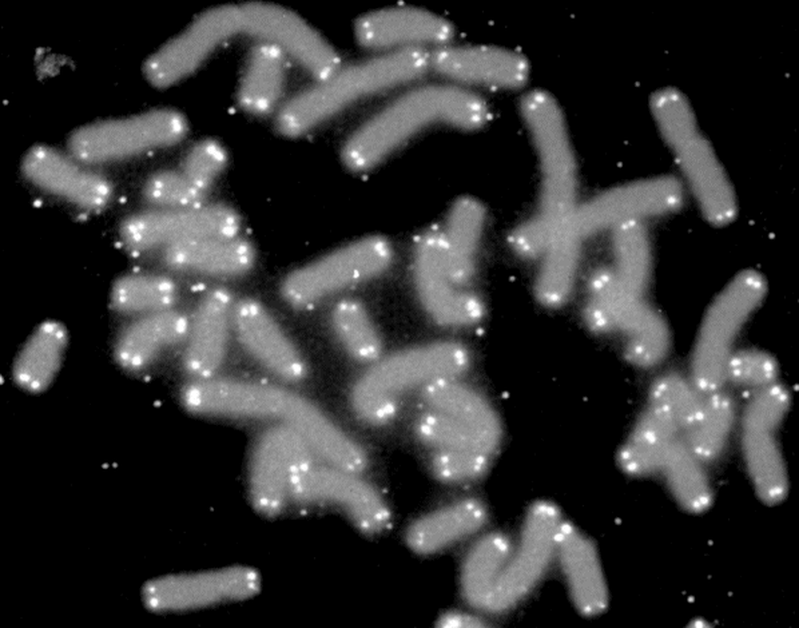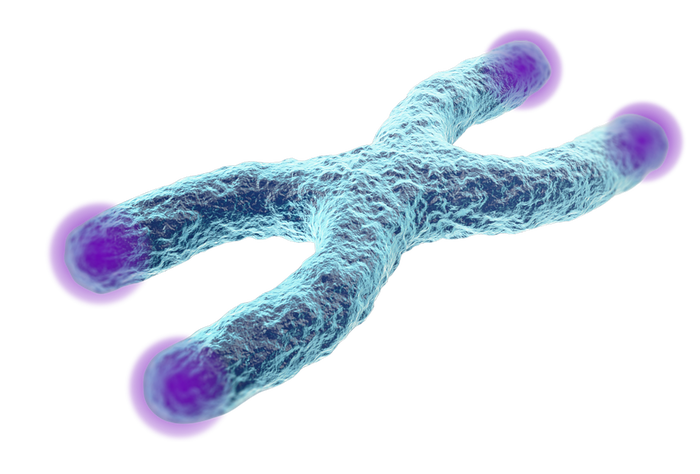How Psychological Stress Gets Under the Skin
Telomeres are structures made from DNA-protein complexes that are found at the ends of all chromosomes and are required for cell division. Telomeres shorten after each cell division and tell the cell when to stop replicating. Like the plastic caps at the end of shoelaces, telomeres protect the ends of chromosomes, making them serve as the body’s “molecular clocks.” However, due to a hypothesis known as the end-replication problem, telomeres progressively shorten over time with each cell division, which leads to genomic instability. Scientists have discovered through measuring the telomere length of people of different ages that telomeres become shorter with age. Luckily, the human body also has biological enzymes that overcome and maintain the shortening of telomeres, called telomerase enzymes.
Telomere length, along with age, is also affected by lifestyle factors such as smoking, physical activity, and sleep, which means telomere length shortening isn’t consistent for everybody. It is possible that a 70-year-old adult and a 20-year-old adult may have the same telomere length, meaning telomere length and shortening are quite diverse. Nonetheless, shortened telomeres have been found to be associated with accelerated aging and aging has been linked to increased susceptibility of chronic diseases such as heart disease, obesity, type 2 diabetes,and Alzheimer’s disease. All of these chronic diseases have also been associated with telomere shortening. While there is a clear connection between disease and telomere length, it is unclear which one causes the other. Additionally, because psychological stress is now acknowledged as one of the major risk factors contributing to human health, a number of studies have explored the linkage between psychological stress, accelerated aging, and disease.
Telomere length, along with age, is also affected by lifestyle factors such as smoking, physical activity, and sleep, which means telomere length shortening isn’t consistent for everybody. It is possible that a 70-year-old adult and a 20-year-old adult may have the same telomere length, meaning telomere length and shortening are quite diverse. Nonetheless, shortened telomeres have been found to be associated with accelerated aging and aging has been linked to increased susceptibility of chronic diseases such as heart disease, obesity, type 2 diabetes,and Alzheimer’s disease. All of these chronic diseases have also been associated with telomere shortening. While there is a clear connection between disease and telomere length, it is unclear which one causes the other. Additionally, because psychological stress is now acknowledged as one of the major risk factors contributing to human health, a number of studies have explored the linkage between psychological stress, accelerated aging, and disease.
A 2022 study conducted a literature examination that involved identifying articles that connected telomeres, accelerated aging, and a myriad of psychiatric disorders such as depression, bipolar disorder, post traumatic stress disorder, schizophrenia, and more. Through thorough screenings and evaluations, 73 records were included in the review. Some found that longer telomeres are correlated with an increase in the number of years of a healthy life and a longitudinal study discovered that shorter telomere length is connected with higher mortality rates and death by infectious diseases.
Regarding stress, psychosocial stress has long been known to be a major risk factor for early onset of common and complex age-related disorders. The physiological reactions to stress, such as increased heart rate and breathing, are well established. However, the mechanisms of how stress affects the body at a cellular level are not quite known. According to the review, while several mental disorders are associated with increased risk of serious somatic disorders, some of the studies also showed that prenatal stress and adverse childhood experiences also contributed to telomere shortening in adult life. One study from the review in particular showed how healthy people without any diagnosis of psychiatric disorders still had shortened telomeres due to exposure to adversity during childhood. Telomerase activity is also negatively affected by stress and mental health disorders—although medication and SSRI treatment helped increase both telomere length and telomerase activity.
While there have been many different studies and reviews showing the association between psychological stress, telomere shortening, and age accelerated disease, the cause remains a mystery. However, it is still important to note that every one of these studies contributes to the understanding of the role of telomeres in aging, and illuminates the significance of psychological stress resilience and stress prevention in future research.
Regarding stress, psychosocial stress has long been known to be a major risk factor for early onset of common and complex age-related disorders. The physiological reactions to stress, such as increased heart rate and breathing, are well established. However, the mechanisms of how stress affects the body at a cellular level are not quite known. According to the review, while several mental disorders are associated with increased risk of serious somatic disorders, some of the studies also showed that prenatal stress and adverse childhood experiences also contributed to telomere shortening in adult life. One study from the review in particular showed how healthy people without any diagnosis of psychiatric disorders still had shortened telomeres due to exposure to adversity during childhood. Telomerase activity is also negatively affected by stress and mental health disorders—although medication and SSRI treatment helped increase both telomere length and telomerase activity.
While there have been many different studies and reviews showing the association between psychological stress, telomere shortening, and age accelerated disease, the cause remains a mystery. However, it is still important to note that every one of these studies contributes to the understanding of the role of telomeres in aging, and illuminates the significance of psychological stress resilience and stress prevention in future research.
Featured Image Source: U.S Department of Energy Human Genome Program
RELATED ARTICLES
|
Vertical Divider
|
Vertical Divider
|
Vertical Divider
|






